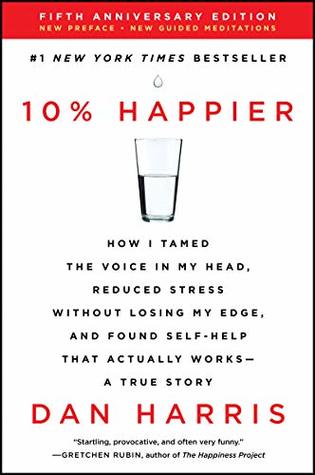More on this book
Community
Kindle Notes & Highlights
by
Dan Harris
Read between
April 12 - April 26, 2023
The ego is never satisfied. No matter how much stuff we buy, no matter how many arguments we win or delicious meals we consume, the ego never feels complete.
The ego is constantly comparing itself to others.
Perhaps the most powerful Tollean insight into the ego was that it is obsessed with the past and the future, at the expense of the present.
The present moment is all we’ve got.
“When you have one foot in the future and the other in the past, you piss on the present.”
How do we do a better job of staying in the Now? Tolle’s answer: “Always say ‘yes’ to the present moment.” How do we achieve liberation from the voice in the head? His advice: simply be aware of it.
“Make the present moment your friend rather than your enemy. Because many people live habitually as if the present moment were an obstacle that they need to overcome in order to get to the next moment.
When you’re totally present, whatever the situation is, good or bad, it’s gonna pass. The only thing that remains is the moment.
the Buddha’s main thesis was that in a world where everything is constantly changing, we suffer because we cling to things that won’t last.
They had a term, too, for that thing I did where something would bother me and I would immediately project forward to an unpleasant future (e.g., Balding → Unemployment → Flophouse). The Buddhists called this prapañca (pronounced pra-PUN-cha), which roughly translates to “proliferation,” or “the imperialistic tendency of mind.”
In a nutshell, mindfulness is the ability to recognize what is happening in your mind right now—anger, jealousy, sadness, the pain of a stubbed toe, whatever—without getting carried away by it. According to the Buddha, we have three habitual responses to everything we experience. We want it, reject it, or we zone out. Cookies: I want. Mosquitoes: I reject. The safety instructions the flight attendants read aloud on an airplane: I zone out. Mindfulness is a fourth option, a way to view the contents of our mind with nonjudgmental remove.
Mindfulness represented an alternative to living reactively.
method for applying mindfulness in acute situations, albeit with a somewhat dopey acronym: RAIN. R: recognize A: allow I: investigate N: non-identification
What mindfulness does is create some space in your head so you can, as the Buddhists say, “respond” rather than simply “react.”
The only way to make it through this thing is to reach some sort of armistice with the present moment, to drop our habit of constantly leaning forward into the next thing on our agenda. I just can’t seem to do it, though.
Once you’ve achieved choiceless awareness, you see so clearly how fleeting everything is.
The real superpower of meditation is not just to manage your ego more mindfully but to see that the ego itself has no actual substance.
“It’s amazing,” I said, “because everything we experience in this world goes through one filter—our minds—and we spend very little time bothering to see how it works.”
We live so much of our lives pushed forward by these “if only” thoughts, and yet the itch remains. The pursuit of happiness becomes the source of our unhappiness.
In moments where I was temporarily able to suspend my monkey mind and simply experience whatever was going on, I got just the smallest taste of the happiness I’d achieved while on retreat.
The root hap means “luck,” as in hapless or haphazard. What the science was showing was that our levels of well-being, resilience, and impulse control were not simply God-given traits, our portion of which we had to accept as a fait accompli. The brain, the organ of experience, through which our entire lives are led, can be trained. Happiness is a skill.
When you lurch from one thing to the next, constantly scheming, or reacting to incoming fire, the mind gets exhausted. You get sloppy and make bad decisions.


